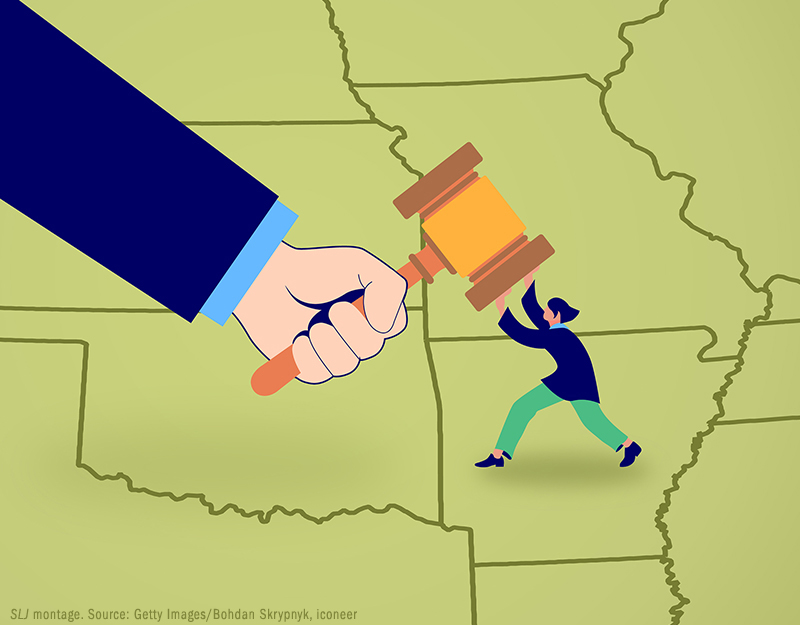A State-by-State Guide to the Coalitions and Campaigns Fighting Legislation Criminalizing Librarians
Here is a look at the strategies and messaging in eight states with recent bills to remove the prosecution exemption for librarians and educators in current obscenity laws.

State legislatures across the country are attempting to remove the prosecution exemption for educators and librarians in obscenity laws. The wording of these bills is similar across the states, but all politics are local, and strategies to fight these harmful bills are different in each state. Librarians and advocates consider the specific interests and concerns of state residents and legislators, build coalitions, and create specific messaging and advocacy campaigns.
Here is a look at the messaging, coalitions, and strategies of advocates in eight states with recent bills to remove the prosecution exemption for librarians and educators in current obscenity laws. There are at least 17 states with similar legislation. While every situation differs, library advocates can learn from actions and coalitions in other states.
Arkansas: The original message of those trying to defeat the SB81 was simple and clear: Librarians shouldn’t be arrested for doing their jobs. As the bill’s language was amended and shifted focus, it is now more of a First Amendment fight. The advocacy efforts, led by Advocates for All Arkansas Libraries, also point out government overreach and redundancy of the bill.
 |
Maine is one of many states with harmful bills in this legislative session. |
Maine: The Maine Association of School Libraries and Maine Library Association have built a large, diverse coalition by reaching out to professionals who work with a population that would be impacted by the bill, LD123. Those organizations include the ACLU of Maine, the Maine Council for English Language Arts, the Maine Curriculum Leaders Association, the Maine Humanities Council, the Maine Chapter of the National Social Workers Association, the Maine Writers and Publishers Alliance, and The Telling Room.
Montana: House Bill 234 was amended to remove the prosecution threat to public librarians and museum employees; however, school librarians remain in current draft. The advocacy message in Montana has been very local, leaning into people’s relationships with their librarians and trust that they have in their school and public libraries. Messaging also includes the fact that the bill could be used to ban “classics”—a consequence that the bill’s supporters don’t want. And the bill harms institutions and undermines basic freedoms, advocates argue. The coalition that helped change the bill included the Montana Library Association, the Montana Federation of Public Employees, and the Montana Art Gallery Directors' Association: MAGDA.
Nebraska: This is the third year a bill like LB441 this has been proposed. When the Nebraska School Library Association (NSLA) became aware of the first bill in January 2021, its advocacy committee had only one member. It grew quickly. Responding to that bill created a close working relationship between the NSLA and the Nebraska Library Association. The coalition has since added the Nebraska Library Commission. This year, they are reaching out to other education associations in the state as well.
New Hampshire: The New Hampshire School Library Media Association (NHSLMA) is leading a broad coalition of stakeholders in opposition to HB514. Their message supports families while also opposing the legislation: The NHSLMA respects a parent’s right to make decisions for its own family, not everyone else’s; and supports students making informed decisions that are the best fit for them and their families.
North Dakota: There are two bills in North Dakota related to obscenity laws: HB1205 and SB2360. The state coalition fighting these bills includes the North Dakota Library Association (NDLA), Prairie Action ND, and ACLU of North Dakota. NDLA has been getting the word out to membership through email and Facebook updates and to the community by coordinating with other public-facing organizations. Personal relationships are important, so as part of the campaign, librarians are inviting local legislators to the library to show them around and explain their programs. They’re inviting them to events and discussing legislation that positively impacts libraries. These efforts establish a strong line of communication at times when the situation isn’t acrimonious.
South Carolina: When H3826 was proposed, the South Carolina Association of School Librarians and South Carolina Library Association provided advocacy/legislative updates to their members [to meet concerns, engage them in advocacy opportunities, and offer a variety of support. Beyond the simple reminder that libraries are good and important, advocates in South Carolina are sharing library policies and procedures and amplifying the message that this bill is government overreach. The librarians’ coalition includes Freedom to Read SC, American Association of University Professors, and the South Carolina Archivist Association.
Wyoming: Early advocacy efforts helped defeat HB0220, which died in committee. When Wyoming Library Association officers anticipated the bill was going to be proposed, they boosted their messaging and sought the most effective way to communicate regularly with members (listserv, email, through the membership platform, etc). The advocacy push included identifying legislators who would support librarians in advance of the bill, and, because Wyoming is so geographically spread out, locating people close to the capital who could talk to legislators in person or attend committee hearings. When the bill was proposed, advocates organized a campaign for people to email legislators and got the message out on social media. People were also asked to wear purple for committee meetings as a clear way for legislators to see support to defeat the bill.
RELATED
The job outlook in 2030: Librarians will be in demand
The job outlook in 2030: Librarians will be in demand
ALREADY A SUBSCRIBER? LOG IN
We are currently offering this content for free. Sign up now to activate your personal profile, where you can save articles for future viewing






Add Comment :-
Be the first reader to comment.
Comment Policy:
Comment should not be empty !!!